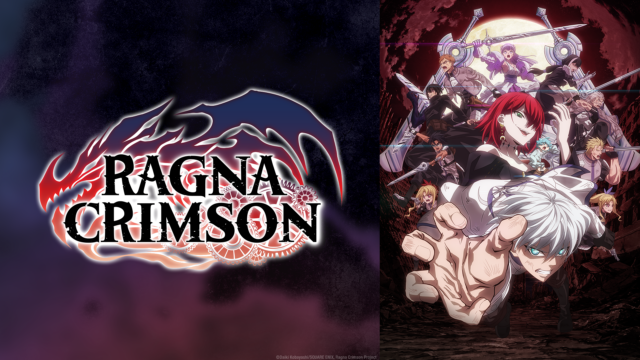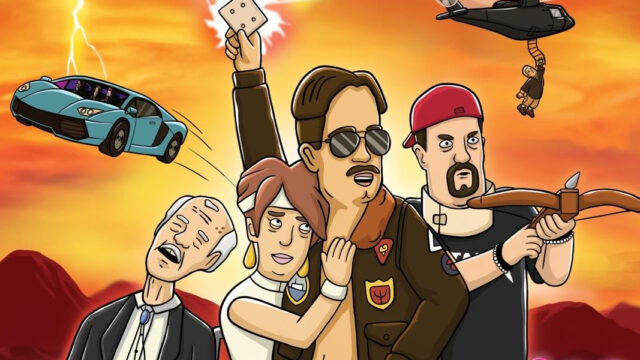English Dub Review: Double Decker! Doug & Kirill “A. Kroyd Killer”
Verbal Kint is practically irrelevant
Overview
Just as he’s being sentenced to death, one of the leaders of Esperanza—the leading Anthem dealers in the city-state—has new testimony to render. The catch is that he’ll only render it to Doug. Seven-O arrives on the scene, and the leader, Z, confesses to killing the gang’s leader, A, for the Bamboo Man who was pulling the strings back during the labor union episode. Z takes Doug and Kirill to where he buried the bodies, an abandoned elementary school, but a high ranking member of Esperanza shows up. He easily outclasses Seven-O, and both he and Z get away.
Our Take
Animation has always had a cavalier spirit when it comes to borrowing from live action. It’s usually intended as an homage, and I think that animators are given quite a bit of slack for doing so, as painstakingly recreating something in animation is so difficult that they almost deserve a pat on the back rather than a wag of the finger. Old Loony Tunes are based on Chaplin and Keaton-era silent film. In the 60’s Hanna-Barbera lifted comedian’s entire personalities, such as Curly for Jabberjaw’s eponymous shark. Even now, scenes from Akira and Ghost in the Shell are the fodder of Steven Universe and Rick and Morty’s flights of fancy. This is usually done in service of something, though. Some aspect of the source material is used to enhance the story being told by the animated mimesis.
If it isn’t obvious, I was once again disappointed by Double Decker. I’m once again incensed that the show refuses to accept the weight that comes with its premise, and continues to live in the land of an eighties cop movie. It’s not the time for that kind of story right now, and I’m starting to feel like a broken record. In this episode, it turns out that Doug was wrong to trust the wishes of a dying man because when it comes to Anthem, there are no innocents. Affording dignity to those in the prison system is not only foolish but dangerous. This episode once again vindicates brutality by law enforcement officers.
But that’s not what’s stuck in my craw this week. It is this lifting of The Usual Suspects ending. I am a fan of the film, and star Kevin Spacy’s horrible misconduct notwithstanding, it is a truly great crime film. I don’t think that brings it to a mythical status that means it can never be borrowed from, but I think some respect for the source material is necessary. I was pretty okay with Double Decker ripping off the rocket-car sequence from the first Men in Black, and while naming a club after Trainspotting is pretty tasteless, that movie’s sequel did more to damage the film’s legacy than a reference in a second tier anime ever will. I just think they went too far this time.
The ending of the Usual Suspects is built to over the course of the film. A character we’ve only heard of in legend turns out to be a character that we had known all along. It is truly one of the great twists of cinema, and borrowing its legendary pedigree does come with some expectation that it won’t be totally sullied. In this Double Decker episode, we already know that Z is a criminal and a big one at that. He’s one of the leaders of the main antagonist’s gang. He may not be in the inner circle, but he’s certainly upper echelon. Finding out that he’s still a dangerous threat is not only not really a shock (even a small amount of attention paid to this show lets you know they won’t pass up a chance to try to make you feel the fool forever being sympathetic to a character), it’s not interesting. The whole thing reeks of anticlimax and left a bad taste in my mouth.
There are other things. There’s the title that I can’t decipher. (Is it a reference to the actor?) Doug’s motivation has once again changed. He has yet another partner who was actually killed this time, making Derek a superfluous character. Kirill is still infuriating. But this show’s irreverence and cultural vandalism is really the most important complaint of mine today. It’s not enough that this show wants to be so divorced from reality that it can have its cake and eat it too on the cop/addict archetypes, but they also want to pillage the United States’ pop cultural touchstones and regurgitate them devoid of any meaning.
Maybe this is what Japanese people have felt after we’ve borrowed their anime imagery for so long. Turnabout may be fair play, but it’s not necessarily entertaining.



























Hi Ashley, thank you so much for reading and we love the feedback. Note that on that day we had 14th posts go up and only ten posts show on the front page, so it's possible the preview had already been archived by the time you got to it. One recommendation would be to add our RSS feed to your favorite news aggregator service like Feedly, this way you get all of the latest posts!